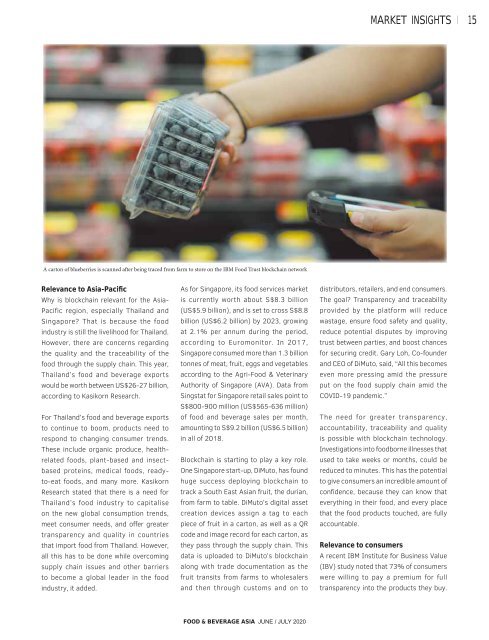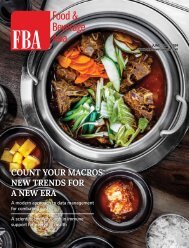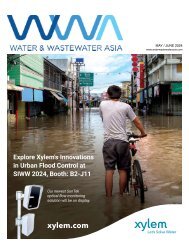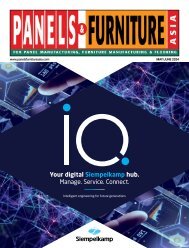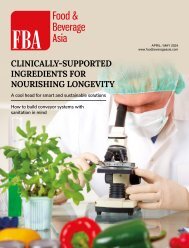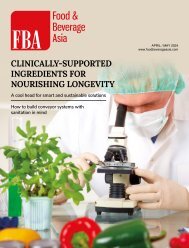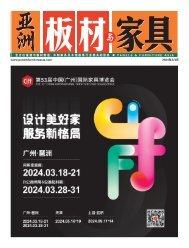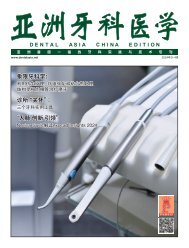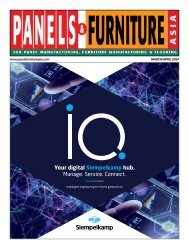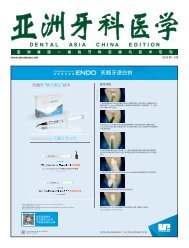Food & Beverage Asia June/July 2020
Food & Beverage Asia (FBA) is the leading source of food and beverage news in Asia since 2002. FBA delivers a comprehensive view of the food and beverage landscape, spanning across the latest health and nutrition trends and industry innovations in ingredients, recipe formulations, food science, sustainability, packaging, and automation, as well as advancements in agri and food-tech.
Food & Beverage Asia (FBA) is the leading source of food and beverage news in Asia since 2002. FBA delivers a comprehensive view of the food and beverage landscape, spanning across the latest health and nutrition trends and industry innovations in ingredients, recipe formulations, food science, sustainability, packaging, and automation, as well as advancements in agri and food-tech.
Create successful ePaper yourself
Turn your PDF publications into a flip-book with our unique Google optimized e-Paper software.
MARKET INSIGHTS<br />
15<br />
A carton of blueberries is scanned after being traced from farm to store on the IBM <strong>Food</strong> Trust blockchain network<br />
Relevance to <strong>Asia</strong>-Pacific<br />
Why is blockchain relevant for the <strong>Asia</strong>-<br />
Pacific region, especially Thailand and<br />
Singapore? That is because the food<br />
industry is still the livelihood for Thailand.<br />
However, there are concerns regarding<br />
the quality and the traceability of the<br />
food through the supply chain. This year,<br />
Thailand’s food and beverage exports<br />
would be worth between US$26-27 billion,<br />
according to Kasikorn Research.<br />
For Thailand’s food and beverage exports<br />
to continue to boom, products need to<br />
respond to changing consumer trends.<br />
These include organic produce, healthrelated<br />
foods, plant-based and insectbased<br />
proteins, medical foods, readyto-eat<br />
foods, and many more. Kasikorn<br />
Research stated that there is a need for<br />
Thailand’s food industry to capitalise<br />
on the new global consumption trends,<br />
meet consumer needs, and offer greater<br />
transparency and quality in countries<br />
that import food from Thailand. However,<br />
all this has to be done while overcoming<br />
supply chain issues and other barriers<br />
to become a global leader in the food<br />
industry, it added.<br />
As for Singapore, its food services market<br />
is currently worth about S$8.3 billion<br />
(US$5.9 billion), and is set to cross S$8.8<br />
billion (US$6.2 billion) by 2023, growing<br />
at 2.1% per annum during the period,<br />
according to Euromonitor. In 2017,<br />
Singapore consumed more than 1.3 billion<br />
tonnes of meat, fruit, eggs and vegetables<br />
according to the Agri-<strong>Food</strong> & Veterinary<br />
Authority of Singapore (AVA). Data from<br />
Singstat for Singapore retail sales point to<br />
S$800-900 million (US$565-636 million)<br />
of food and beverage sales per month,<br />
amounting to S$9.2 billion (US$6.5 billion)<br />
in all of 2018.<br />
Blockchain is starting to play a key role.<br />
One Singapore start-up, DiMuto, has found<br />
huge success deploying blockchain to<br />
track a South East <strong>Asia</strong>n fruit, the durian,<br />
from farm to table. DiMuto’s digital asset<br />
creation devices assign a tag to each<br />
piece of fruit in a carton, as well as a QR<br />
code and image record for each carton, as<br />
they pass through the supply chain. This<br />
data is uploaded to DiMuto’s blockchain<br />
along with trade documentation as the<br />
fruit transits from farms to wholesalers<br />
and then through customs and on to<br />
distributors, retailers, and end consumers.<br />
The goal? Transparency and traceability<br />
provided by the platform will reduce<br />
wastage, ensure food safety and quality,<br />
reduce potential disputes by improving<br />
trust between parties, and boost chances<br />
for securing credit. Gary Loh, Co-founder<br />
and CEO of DiMuto, said, “All this becomes<br />
even more pressing amid the pressure<br />
put on the food supply chain amid the<br />
COVID-19 pandemic.”<br />
The need for greater transparency,<br />
accountability, traceability and quality<br />
is possible with blockchain technology.<br />
Investigations into foodborne illnesses that<br />
used to take weeks or months, could be<br />
reduced to minutes. This has the potential<br />
to give consumers an incredible amount of<br />
confidence, because they can know that<br />
everything in their food, and every place<br />
that the food products touched, are fully<br />
accountable.<br />
Relevance to consumers<br />
A recent IBM Institute for Business Value<br />
(IBV) study noted that 73% of consumers<br />
were willing to pay a premium for full<br />
transparency into the products they buy.<br />
FOOD & BEVERAGE ASIA JUNE / JULY <strong>2020</strong>


